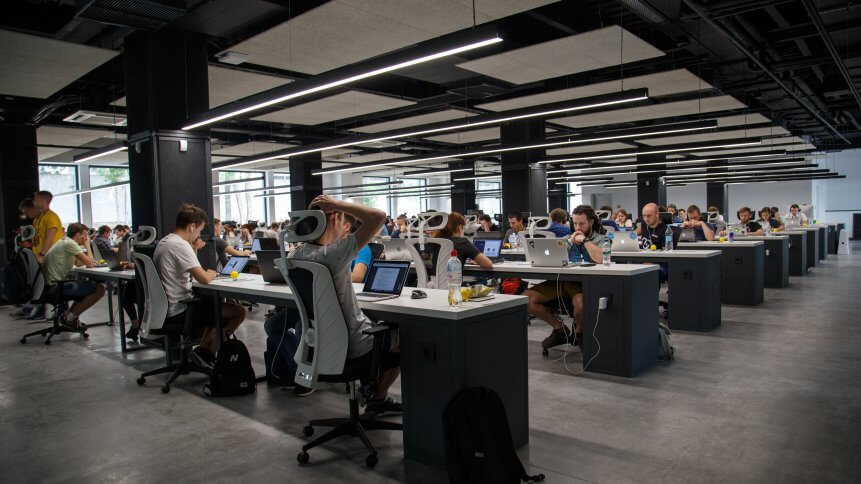Why digital HR & HR tech is about people not technology

Millennials have become the largest generation in the workforce. Unbelievably, some are now preparing for middle age. Replacing them? A Gen Z workforce who cannot remember a time before the iPad or on-demand access to anything their heart desires.
The expectation of employees is accelerating as they bring the insatiable thirst for better digital experiences into the professional world. As a result of these changes, an increasing number of start-ups are looking to disrupt the industry of HR Tech and Digital HR as the digital transformation of human resources takes shape.
The modern mantra of ‘disrupt or be disrupted’ has all organizations looking over their shoulder. How will the next big thing impact their industry? This is one of many questions keeping business leaders awake at night. Trying to stay ahead of the curve and securing a competitive advantage can be exhausting— but tech alone cannot give you the answers you need.
Sure, emerging technologies such as AI are making it much easier to dramatically improve workflows, employee engagement, attract and find your next hires and boost productivity. However, in a mobile-first and digital world technology also needs to help solve a few of the problems that it created.
Digital HR and constant staff development
One of the most significant changes to products and services is that everything must continue to evolve long after the transaction has been completed. Businesses must also constantly adapt to the changing digital landscape to remain relevant and meet the needs of its customers.
Just like software, employees must also learn to adapt and upgrade their skills.
Future-proofing employees and ensuring that they remain motivated on a new path of continuous learning is much harder than many realize. The rise of the gig economy is also taking staff out of the recruitment pool as they decide to dictate their own conditions and work with who they want and on their own terms.
HR Tech should not just be about replacing departments and automating complex processes. It should be used to obtain a greater understanding of how all staff members will have different motivations and how you can help them adjust to new ways of thinking or working.
The concept of a job and how we work has evolved. The traditional job title is restrictive in an agile world of projects and tasks that give a company a competitive edge. Employee wellbeing and attracting new talent are further examples of how the role of HR is to prepare their organizations to flourish in a digital-era of exponential change.
YOU MIGHT LIKE

Four trends driving workplace tech adoption
Immersive learning experiences
Whereas previous generations in the workplace feared technological change, digital natives see it as an enabler. We can expect to see more digital employee experiences that are driven by the expectations of its employees.
For example, compliance learning that consists of hitting the ‘next’ button for 20 minutes is no longer going to cut it, and neither is death by PowerPoint. Immersive learning that leverages augmented reality and even VR can improve information retention and finally upgrade workplace learning.
One-size-fits-all courses and ‘sit and learn’ programs will not have the desired effect on staff who are surrounded by personalized experiences. To genuinely connect and ensure users retain information, it needs to actively encourage personal perspectives and preferences of the user to provide a more fluid learning experience. Technology makes this possible, but it’s the learner driving the learning experience rather than the other way around.
It’s about people, not technology
Some businesses have fallen into the trap of using technology to replace staff. Sure, emerging technologies such as AI and machine learning are helping to streamline or even automate tasks, speed up query resolution, screen candidates and dramatically improve throughput. But if it’s at the expense of HR staff, it will be a wasted opportunity for your company to truly thrive in a digital age.

Employees should have constant opportunities to learn. Source: Shutterstock
The automation of HR will create a different demand for specific qualities that require a much more human touch. For too long, we have left staff performing repetitive and mundane tasks that are better suited to machines rather than human beings. By contrast, we genuinely excel when building strategies, empathizing with people, being creative, and making data-driven decisions.
The inconvenient truth is that many organizations have been wasting the talents of their employees. But there is a fantastic opportunity for them to make a genuine impact in new, dynamic roles more suited to their unique skills. Businesses that enable their workforce to adapt to change, continuously learn, and work alongside technology, rather than being replaced by it will be the ones that thrive in an age of automation.
Now more than ever, organizations need HR staff to work alongside employees during the transitional phase that automation will bring. HR Tech or Digital HR is not actually about technology at all; it’s about building relationships with your people. It’s time to look at the bigger picture and how a business can flourish by enabling tech and employees to complement each other as we head towards a smart hybrid human-AI workforce.








